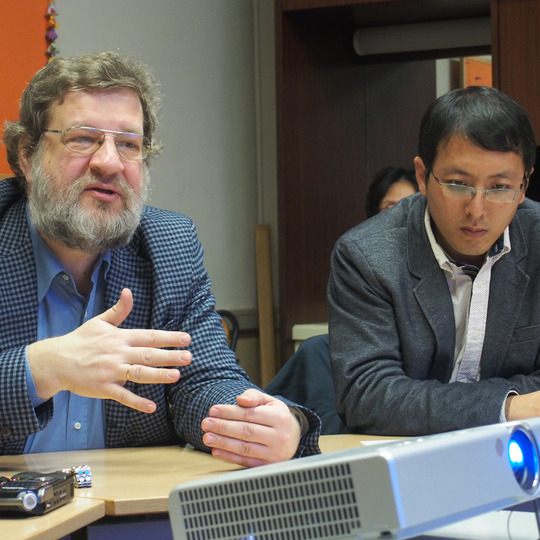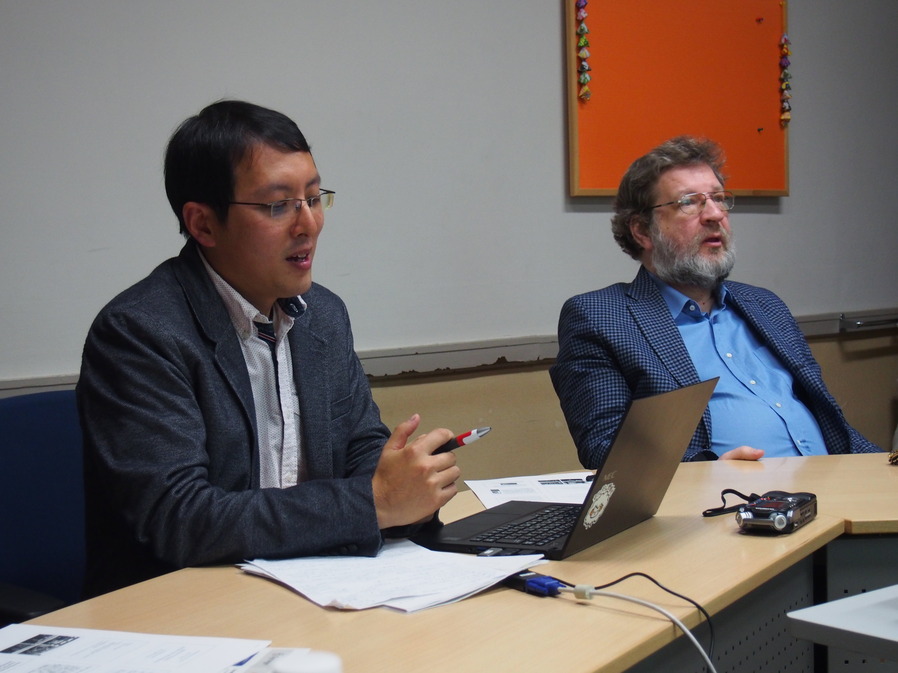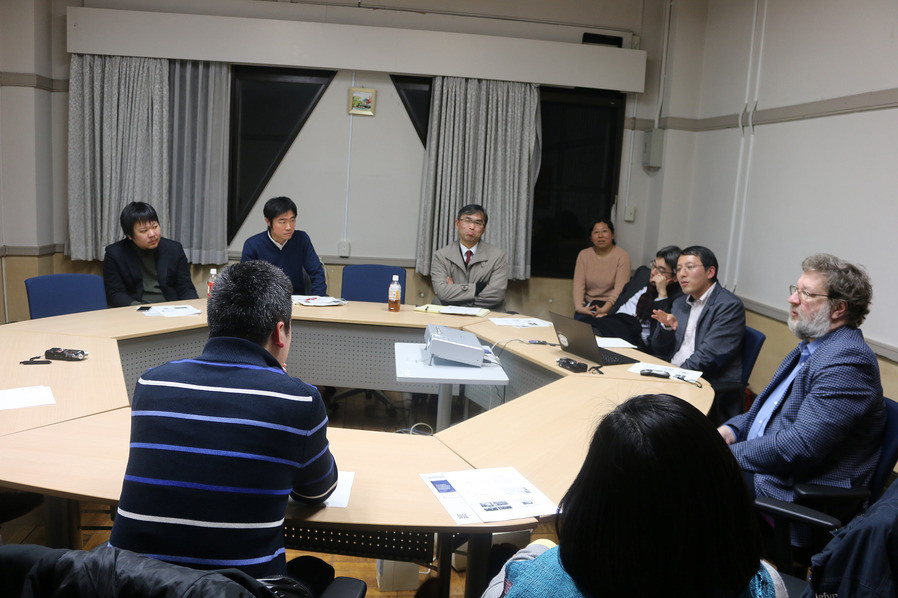
Report: Globalizing Japanese Philosophy: Praxis and Politics in Civil Society Yoojin Koo
- Time and Date
- 16:30-19:00, Thursday, January 29, 2015
- Venue
- Seminar Room, 2nd Floor, Building 101, The University of Tokyo, Komaba
- Speaker
-
Dr. Rein Raud (University of Helsinki, Finland)
Dr. CHEUNG Ching-Yuen (The Chinese University of Hong Kong) - Organized by
- the "Disparity and Human Rights" Unit, Integrated Human Sciences Program for Cultural Diversity, The University of Tokyo
The Project 2, on "Disparity and Human Rights" was privileged to be a host of the workshop "Globalizing Japanese Philosophy: Praxis and Politics in Civil Society," featuring eminent international scholars who have made an important contribution to the worldwide study of Japanese philosophy. The participants were Dr. Rein Raud of the University of Helsinki, Finland, and Dr. Ching-Yuen Cheung from the Chinese University of Hong Kong. Dr. Rein Raud’s researches extend from Japanese philosophy to literature, culture, and comparative Asian philosophy, as illustrated by his recent appointment to the post of President of the European Association for Japanese Studies (EAJS) . Dr. Ching-Yuen Cheung is one of the young prominent scholars who are leading the Japanese philosophy research in the Chinese-speaking world. His research interests include representative Japanese philosophers, and the influence and applicability of philosophy to public spheres, as exemplified by his recent visits to tsunami-affected areas in Tohoku. Throughout the workshop, which included presentations on "Breaking out of the Bounds of Language" by Dr. Rein Raud and "Japanese Philosophy, Karatani Kojin, and Hong Kong" by Dr. Ching-Yuen Cheung, participants discussed a wide range of questions: How is Japanese philosophy read around the world?; How does Japanese philosophy engage with civil societies? And what are the signs and clues that Japanese philosophy matters and can provide insights not only in Japan but around the world⎯in other words, what are the globalizing aspects of Japanese philosophy?"
First, Dr. Raud introduced the ways in which Japanese philosophy is read around the world, emphasizing the crucial role played by translation in disseminating Japanese ideas. At the same time, Japanese words have complex and subtle meanings that can be lost in translation, leaving behind only superficial definitions that undermine the ability of readers to gain a comprehensive understanding of Japanese thoughts, culture, and philosophy. To resolve this dilemma, he argued that translation should be regarded as genuinely creative work.

Dr. Cheung suggested the importance of the finding universal elements of Japanese philosophy that can be of value to other regions of the world and demonstrated how Japanese philosophical ideas could be relevant to last year’s Umbrella Movement in Hong Kong. I was particularly impressed with the globalizing elements of Japanese philosophy discussed in Dr. Cheung’s talk. In one of his projects, Dr. Cheung has focused on Japanese philosophy as an academic discipline in order to provide comprehensive and systematic texts for research, thus making Japanese philosophy comparable to western and non-western philosophical traditions. He presented three key terms: Japanese philosophy, Kojin Karatani, and Hong Kong. Drawing on the ideas of one of the most renowned and influential Japanese philosophers, Kojin Karatani, he discussed the Umbrella Movement in Hong Kong viewed in light of Karatani’s thoughts. He began by analyzing Karatani’s thoughts about modes of exchange, which were influenced by Marx’s modes of production. Among the four types of modes in Karatani’s model listed in a 2 x 2 matrix, as A (top right, not-free and reciprocal), B (top left, neither free nor reciprocal as in the case of plunder), C (bottom right, free and not-reciprocal), and D (bottom left, free and reciprocal), Karatani focused on mode D, in which the mode of exchange is free and reciprocal, as exemplified in Marx’s model of "communism" and Chomsky’s "libertarian socialism." Karatani referred to this model as "X," which does exist not in reality but only as an idea. This D mode is explained in the book On Nomadization: Kunio Yanagita and the Sanjin people roving over mountains (2014).
Karatani argued that mode D can be derived from "nomadization," using clues that suggest the transcendence of capital, nation, and state. Dr. Cheung used his ideas to show how several aspects of the umbrella movement in Hong Kong was related to mode D. The Hong Kong umbrella movement lasted from September to December, 2014; it protested against electoral control by the Communist Party. More than 100,000 people, at its peak⎯including college students who were the leaders of the movement⎯gathered together and occupied the Admiralty and Central districts. Dr. Cheung’s observation of the demonstration participants holding up anti-capitalism and anti-colonialism signs convinced him that an example of mode D had spontaneously emerged in Hong Kong; sit-in demonstrators started to share and donate commodities among one another and nomadization of young people in Hong Kong has escalated in recent years due to the unreasonable cost of rental housing. At the same time, however, nationalism in Hong Kong has also been revived by this movement, which is another intriguing topic.
To sum up, the insight-filled talks by Dr. Raud and Dr. Cheung suggested ways to approach the questions above; how to globalize Japanese philosophy and engagement with civil society. Dr. Raud focused on the role of translation and Dr. Cheung on applicability. I felt that Dr. Chueng’s talk in particular enabled us to link Japanese philosophy with civil society. As a follow up, Project 2 is planing a field trip to Hong Kong in the middle of March. I feel very privileged to have an opportunity to go to the field to look at, feel, and discover the sphere and elements of mode D. And I am convinced that this process embodies the idea we are aiming for, to bring the theoretical part and praxis together.

報告日:2015年3月1日


